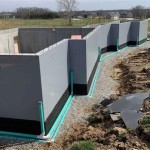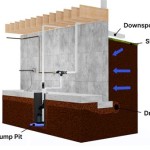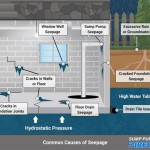Essential Aspects of Spray Foam for Basement Walls
Spray foam insulation is a remarkable material gaining popularity as an effective solution for basement wall insulation. Its unique properties offer numerous advantages, ensuring a comfortable, energy-efficient, and healthy living environment.
Understanding Spray Foam Insulation
Spray foam insulation is a polyurethane-based material applied as a liquid that expands and hardens into a rigid foam. It is available in open-cell or closed-cell formulations, each with distinct characteristics.
Open-cell spray foam is soft and flexible, allowing moisture to pass through. Closed-cell spray foam is more rigid and impermeable, providing excellent moisture resistance.
Benefits of Spray Foam for Basement Walls
- Energy Efficiency: Spray foam has a high R-value, which measures thermal resistance. It forms a continuous, airtight barrier, preventing heat loss and reducing energy consumption.
- Moisture Resistance: Closed-cell spray foam effectively seals basement walls, preventing water seepage and moisture buildup.
- Comfort: Spray foam seals gaps and cracks, preventing drafts and temperature fluctuations, creating a more comfortable living space.
- Noise Reduction: Spray foam acts as a sound barrier, reducing noise from outside or neighboring rooms.
- Health Benefits: Spray foam does not promote mold or mildew growth, which can cause respiratory problems. It also improves indoor air quality by reducing the presence of allergens.
Considerations for Spray Foam Installation
Before installing spray foam, certain factors should be considered:
- Ventilation: Proper ventilation is crucial during and after installation to remove fumes and odors.
- Professional Installation: Spray foam should only be installed by certified professionals to ensure proper application and safety.
- Substrate Preparation: Before applying spray foam, surfaces must be cleaned and prepared to ensure proper adhesion.
- Thickness: The thickness of spray foam insulation required depends on the climate and desired insulation level.
- Cost: Spray foam insulation can be more expensive than other insulation options.
Choosing the Right Spray Foam
Choosing the appropriate spray foam type is critical:
- Open-cell spray foam is recommended for areas where moisture is not a significant concern, such as attics or interior walls.
- Closed-cell spray foam is ideal for areas prone to moisture, such as basements or exterior walls.
Conclusion
Spray foam insulation for basement walls provides numerous advantages, including energy efficiency, moisture resistance, comfort, noise reduction, and health benefits. By understanding the essential aspects of spray foam and considering the factors involved, homeowners can make informed decisions to enhance the comfort and value of their homes.

Basement Wall Insulation Closed Cell Spray Foam Concord Carpenter

How To Insulate Diy Your Basement With Spray Foam

Basement Insulation Upstate Spray Foam

Spray Foam Insulation All You Ever Wanted To Know

Spray Foam Insulation On Basement Improves Home Energy Efficiency Worcester Ma

Best Practices For Insulating Your Basement With Spray Foam Eco Comfort

Basement Spray Foam Insulation Services For Your House

Basements Chicagoland Spray Foam

The Importance Of Basement Insulation Eco Spray

Insulating Basement Wall With Thermaldry System








